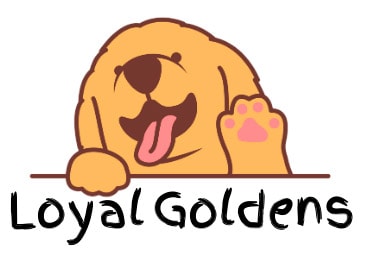Golden retrievers are an extremely vocal dog breed. In addition to barking, they also make a range of other noises, from moaning to grunting. If you’re a golden retriever parent, you may be trying to understand why your golden retriever is making grunting and groaning noises.
Golden retrievers grunt and groan to communicate. They could be trying to let you know that they are hungry, happy, in pain, scared, bored, or just want your attention. It’s essential to observe your golden retriever so you can respond to his grunts and groans appropriately.
To understand what your golden retriever is feeling and is trying to communicate, you’ll have to assess each situation. This article explores the variety of reasons that golden retrievers grunt and groan to give you insight into what your golden’s trying to communicate through his vocalizations.

(This article may contain affiliate links and loyalgoldens may earn a commission if a purchase is made.)
Unlock your goldens natural intelligence and see just how quickly problem behaviors disappear.This is the best at home dog training I've ever used!
Your Golden Retriever Is Happy or Excited
If your golden retriever is grunting when doing a pleasurable activity, such as eating, being petted, stretching, or snuggling, he is probably making a grunting noise because he’s feeling happy and content.
Your golden retriever may also grunt or groan when they’re excited about something- he may begin to grunt when you bring out the leash or are preparing his meal.
The ‘content’ and ‘excited’ grunt or groan will be at a specific pitch, so learn to recognize it and enjoy the idea that your dog is happy!
On the other hand, if your golden retriever is making noises while he’s asleep, he may be dreaming.
Dog trainers and behaviorists often suggest that if a dog groans, grunts or whimpers while sleeping, he or she is most likely engaged in the rapid eye movement (REM) phase of sleep. During REM sleep, dogs dream, and the grunting and groaning is in response to the dog’s dreams.
Recommended Reading: 12 Things Golden Retrievers Like To Do (Fun for Goldens!)
Your Golden Retriever Is Trying To Warn You
If your golden retriever groans when he hears noises outside the home or when a stranger comes into his space, he may be trying to warn you of potential danger. Reassure him that he is safe, and after a while his groaning should subside.
Golden retrievers have a strong sense when something or someone isn’t right, and it is something you should pay attention to if the warning groans don’t stop. I know if I have a stranger over to the house (like a serviceman or contractor) and my otherwise loving, friendly golden retriever doesn’t warm up to them pretty quick, I don’t trust them, and I won’t do business with them again.
Your Golden Retriever Is Anxious
If your golden retriever is groaning at a low, long pitch in a stressful situation, he may be fearful or anxious. These situations may include strangers in your home, a car ride, too much commotion around him, or a visit to the vet. He might also act up in these situations by running around barking, or trying to escape.
These reactions could further indicate that he is experiencing anxiety about the situation. Do your best to calm your golden retriever by petting him and talking to him in a calm, reassuring tone. If he starts making these sounds when you’re getting ready to leave the house it may be an indication he is suffering from separation anxiety.
Your Golden Retriever May Be Bored
Golden retrievers are sporting dogs that have lots of energy. If your dog isn’t getting enough time outdoors or enough exercise, he may begin making a grunting sound as a way to expel energy – or get your attention.
Try to ensure you are walking your golden retriever at least twice a day, allowing him room to run and sprint if possible. You should also provide your dog with toys and nutritious treats to chew on that will allow him to expend energy.
Recommended Reading: The 19 Best Toys Golden Retrievers Will Actually Play With!
Your Golden Retriever May Be Scared
When a golden retriever is scared, they may grunt or groan to signal their fear and look for reassurance. This is often a reaction to loud noises such as thunderstorms or fireworks. You can usually tell if your golden is making noises because they are scarred by watching their body language.
A scared golden retriever will often try to hide in a corner, under a table, inside a closet or even behind his owner. Try providing reassurance through gentle petting, giving rewards (such as treats) for calm behavior, and using a gentle voice to soothe your dog.
Your Golden Retriever May Be Protecting Possessions or Territory
When protecting their territory (usually from another dog), golden retrievers may make deep, low-pitched groans, almost like a growl. If your dog has his teeth bared or his hackles raised (meaning the hair on his back is raised up) when he’s groaning, he is most likely in an aggressive mood.
Golden retrievers are generally a very friendly breed (even to other pets and animals) and will rarely resort to overt aggression. Nevertheless, if your golden retriever is continuously displaying signs of aggression, it will be essential to train him to reduce his aggression and protective tendencies.
Recommended Reading: Are Golden Retrievers Dangerous Dogs? (The Truth!)
Your Golden Retriever May Be Ill or in Pain
If you’ve noticed that your golden retriever is groaning continuously, and you can’t associate it with any of the reasons detailed above, your dog may be ill or injured. You should pay a visit to the vet if your golden retriever suddenly starts grunting or groaning for no apparent reason, as this may be a sign that something within their bodies has changed.
For instance, if your golden retriever starts groaning when he is trying to lie down, he may be developing ascites, a condition where fluid builds in a dog’s abdomen, causing discomfort, lethargy, and difficulty breathing. Groaning when lying down may also be a symptom of arthritis, especially with an older dog.
Another common medical reason for grunting and groaning is panosteitis, also known as ‘puppy growing pains.’ Panosteitis commonly presents in golden retriever puppies and is caused when puppies’ bones grow faster than the rest of their bodies.
As a result, the bones in a puppy’s body become inflamed. To signal their discomfort, the dog will grunt and groan. Panosteitis is a self-limiting disease and fades by the time a dog is two years old. However, you can offer comfort to a dog with panosteitis with medication and a proper diet.
Regardless of the reason for the pain, visit your vet and ask them to conduct a full assessment of your dog’s health. Give your vet as much information as possible, including details about your golden retriever’s diet, exercise, and daily routine.
Discover how to train your Golden Retriever by playing games: 21 games to play with your Golden that will make them smarter and better behaved!
How Can I Prevent a Golden Retriever Grunting?
If your golden retriever is grunting or groaning excessively, you should first take your pup to the veterinarian to eliminate any medical reasons for the vocalization. Taking your golden retriever to the vet will help diagnose any medical conditions or injuries that make your golden retriever grunt and groan.
However, if the vet doesn’t find anything concerning, you can reduce the amount your dog groans by:
- Increasing or decreasing your golden retriever’s exercise: Evaluate the amount of activity your dog is getting and increase it if it seems your golden retriever has too much energy or reduce it if he looks exhausted after walks.
- Reducing the amount of salt in your dog’s diet: This will reduce the risk or impact of ascites, making your dog more comfortable and therefore reducing the need to groan.
- Reducing the positive reinforcement: If you respond to your golden retriever every time he groans, he may begin groaning more just to get attention. Golden retrievers are one of the most intelligent dogs there is, and they will learn very quickly to associate positive attention to their actions. If you’re looking to cut down on the noise, stop responding every time he groans, and he will learn that it is not a behavior that will get him attention.
- Consulting with a canine behavioral therapist: A dog behaviorist will come and observe your dog to try to understand the root causes of the grunts and groans. They can then suggest what parts of your dog’s routine or diet need to be adjusted and can also use behavioral techniques to encourage your dog to grunt or groan less.
Ultimately, it’s important to remember that your golden retriever is grunting or groaning to communicate. Pay attention to the grunts and groans and, if they’re not too extreme, appreciate them as another unique aspect of your dog’s personality.
How Else Do Golden Retrievers Communicate?
As well as grunting and groaning, golden retrievers use a variety of other methods to communicate. Vocal methods include:
- Barking: Golden retrievers are not typically big barkers. So when they do bark, they are trying to tell you something. They generally bark when they want attention or if they are feeling scared or anxious. Golden retrievers are less likely to bark to show aggression as compared to other breeds.
- Whining: When your golden retriever whines, he may be in pain or trying to get your attention. Whines may be at different lengths and pitches depending on what your dog is trying to communicate.
- Body language: Golden retrievers also communicate a lot through their facial expressions using their eyes, ears, and their mouth. For instance, ears perked up may mean that your golden retriever is alert, while if his ears are flat down, it may mean that your dog is scared or angry.
Recommended Reading: How Do Golden Retrievers Show Affection? (Find Out Here!)
Conclusion
Golden retrievers are incredibly communicative and vocal dogs. Goldens will grunt and groan for various reasons, including when they are content, bored, or scared. Golden retrievers also grunt and groan when they are in pain, and if your dog is frequently groaning, you may want to consult with your vet.
By paying close attention to the noises your golden retriever makes, you’ll build on your relationship with him and be able to better communicate and care for him.
Sources:
